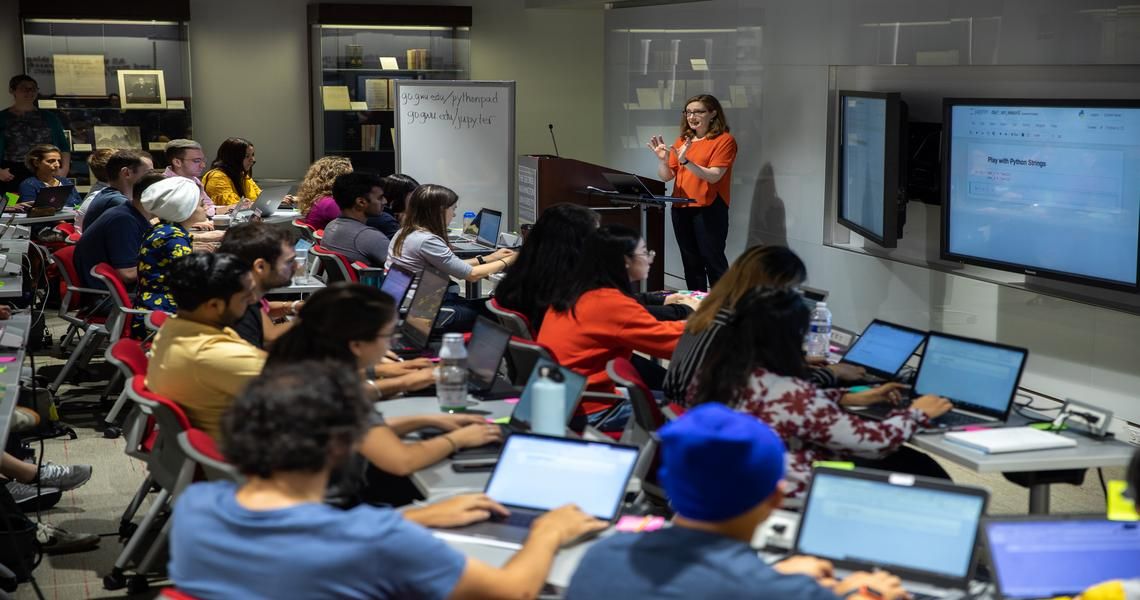
To meet the needs of a busy and diverse workforce, CTSI-CN offers a wide range of seminar series, workshops, and on-demand training opportunities in clinical and translational research. These offerings bring experts directly to our research community to share insights, deliver hands-on training for new tools and resources, and lead discussions on important emerging topics. Take a look at our seminars, workshops, and trainings below and sign up for emails to stay informed of new education offerings.
Seminars and Workshops
- K-Special Interest Group Series (K-SIG)
-
Designed to demystify the career development path for early-career investigators, the K-SIG Seminar Series offers a variety of presentations and workshops that have immediate practical value for anyone involved in clinical and translational research.
Join the CTSI-CN mailing list for information on future K-SIG events.
- Responsible Conduct of Research Series (RCR Series)
-
The RCR Series at Children’s National hosts monthly presentations and discussions with major local and national voices on responsible conduct of research. Featuring a balanced mix of notable guest speakers and intimate discussions, the RCR Series engages the entire research team in discussions of ethics, current regulatory issues, and decision-making in the complicated world of human subjects research.
- Health Equity Seminar Series
-
Since 2018, CTSI-CN has brought together important voices in the area of Health Equity in research for a series of in-depth conversations and candid discussions. Previous seminars have addressed essential topics like implicit bias in research, obstacles to engaging patients with rare diseases in trials, and barriers to recruitment in underrepresented populations.
Join the CTSI-CN mailing list for information on future Health Equity events.
- Health Equity in Research Hackathon
-
The Health Equity in Research Hackathon is the inaugural event for the new Health Equity in Research Unit, a joint initiative between the CTSI-CN and the Center for Translational Research within the Children’s National Research Institute.
We believe bringing diverse minds and communities together is the way to tackle big problems related to health equity. The goal of this hackathon is to explore innovative ways that health care apps can address inequities in clinical and non-clinical areas that impact the ability of children to reach their potential. We envision this hackathon becoming an annual event. Learn more
On-Demand Learning
- Expanded Good Clinical Practice Training
-
For research staff and investigators looking to solidify their foundational knowledge of the practice of clinical research, CTSI-CN offers access to a suite of Good Clinical Practice (GCP)-focused modules licensed from the Association of Clinical Research Professionals. These online trainings cover a wide range of important clinical trial-related topics from both the PI and research staff perspectives, offering targeted content designed to improve skills across the research team. Email CTSINavigator [at] childrensnational [dot] org (CTSINavigator[at]childrensnational[dot]org) for access.
- REDCap 101 Online Training
-
Developed to support investigators during the COVID-19 pandemic, REDCap 101 Online Training is a virtual tour of the versatile REDCap database and survey tool offered through CTSI-CN. This series of online training videos, questionnaires, and exercises (roughly 2.5 hours of training) walks users through the powerful possibilities of REDCap and equips them to take advantage of all REDCap offers.
- Introduction to the Principles and Practice of Clinical Research (IPPCR)
-
Designed to offer a thorough introduction to clinical research for all research professionals, the NIH Office of Clinical Research offers the IPPCR at no cost to anyone who registers. This online course provides in-depth training on the spectrum of clinical research and the research process over approximately 40 modules that can be completed at the trainee’s own pace, leading to a Certificate of Completion. Modules focus on everything from biostatistical and epidemiologic methods, study design, protocol preparation, patient monitoring, quality assurance, ethical and legal issues, and much more.
